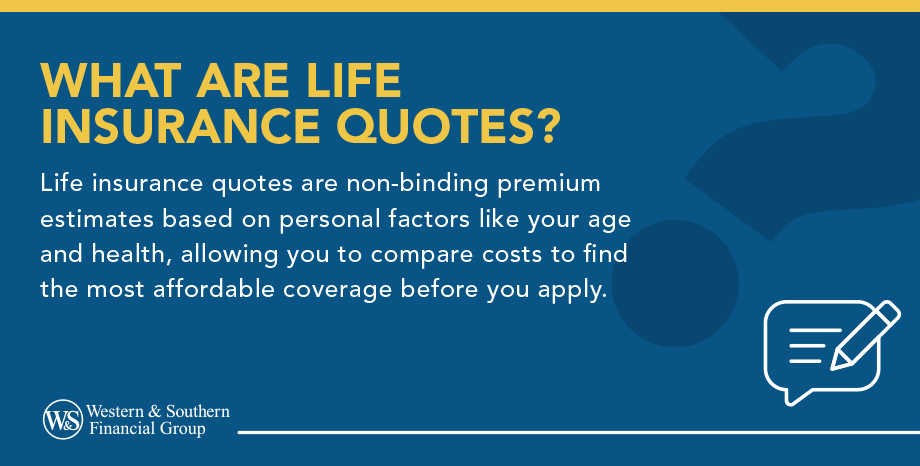

Key Takeaways
- A life insurance quote is a non-binding estimate of your premium, calculated based on your personal risk profile.
- Term life insurance is the most affordable option for temporary needs, while permanent policies like whole life offer lifetime coverage and a cash value component.
- Your age, health status, lifestyle, policy type, and coverage amount are the primary factors insurers use to determine the cost of your premium.
- The best policy isn't always the cheapest. Evaluate an insurer's financial strength, policy conversion options, and customer service reputation before deciding.
- Always be truthful on your application. Misrepresenting your health or habits can lead to a denied claim, leaving your beneficiaries without the death benefit.
Life insurance quotes are personalized estimates of what you'll pay for coverage based on your age, health, lifestyle, and the type of policy you select. Understanding how quotes work and what factors influence your rates empowers you to make informed decisions that can help provide a sense of security for your family’s financial future.
What Are Life Insurance Quotes?
A life insurance quote is basically an estimated premium (the amount you'll pay monthly or annually) for a specific insurance policy. Think of it as a price tag customized to you. Getting quotes is a key step when buying life insurance, as it helps you understand the cost of insurance coverage before you commit to an application.
When you request a quote, life insurance companies evaluate your risk profile. Lower risk means lower premiums. Higher risk (due to health conditions, dangerous hobbies, or occupations) results in higher costs.
Here's what matters: quotes aren't binding. They're starting points for comparison shopping. The actual premium you'll pay may differ slightly after the insurance company completes its underwriting process, which typically includes reviewing your application, medical records, and sometimes requiring a medical exam.
Types of Life Insurance Policies: Understanding Your Options
Different insurance policies serve different purposes, and each generates different life quotes.
Term Life Insurance
Term life provides coverage for a specific period, typically 10, 20, or 30 years. It's the most affordable option by far.
How it works: You pay premiums during the term. If you die within that period, your beneficiaries receive the death benefit. If you outlive the term, coverage ends unless you renew.
Term life makes sense for temporary needs like covering a mortgage, supporting children until they're independent, or replacing income during working years.
Typical quote factors:
- Coverage amount (commonly $250,000 to $1 million)
- Term length
- Your age when purchasing
- Health status
Variations include:
- Simplified issue term life: Offers coverage for a specific period without requiring a medical exam, though applicants must still answer a series of health-related questions.
- Renewable term life: Allows coverage to be extended for another term at a higher premium rate without having to undergo a new medical exam.
- Level term life: Premium payments and the death benefit are guaranteed to remain the same for the entire specified term.
- Online term life: Can be quoted, applied for, and purchased entirely through an insurer's website or a digital platform.
When comparing term life insurance quotes, a healthy 35-year-old might pay $25 to $40 monthly for a $500,000, 20-year term policy. That same person seeking whole life insurance policy would pay significantly more.
Whole Life Insurance
Whole life is a permanent policy that provides lifetime coverage with fixed premiums that never increase. It combines a death benefit with a cash value component that grows tax-deferred over time. Cash value may take years to accumulate unless large premiums are paid up front.
The cash value accumulates slowly at first but accelerates over decades. You can access this money through policy loans or withdrawals, though borrowing reduces your death benefit if not repaid. Loans and withdrawals will reduce the death benefit and may cause the policy to lapse. Loans accrue interest and may generate tax liability if the policy lapses or is surrendered.
Key advantages:
- Guaranteed lifetime coverage regardless of age or health changes
- Predictable, level premiums
- Cash value provides living benefits
- Income-tax-free payout to beneficiaries
Tax-free treatment assumes the policy is not a Modified Endowment Contract, withdrawals do not exceed cost basis, and the policy does not lapse. Always consult your tax advisor regarding your personal situation.
Considerations:
- Higher premiums than term life
- Cash value growth is modest compared to market investments
- Complexity requires careful understanding
Variations include:
- Dividend-paying whole life: The policyholder is eligible to receive annual dividends from the insurance company's profits.
- Simplified issue whole life: Provides lifetime coverage without a medical exam, based on the answers to a series of health questions on the application.
- Guaranteed issue whole life: Offers permanent coverage without requiring a medical exam or any health questions.
When requesting whole life insurance quotes, you'll notice they vary substantially based on the death benefit amount, your age, and health classification.
Universal Life Insurance
Universal life offers flexible premiums and death benefits. You can adjust how much you pay (within limits) and potentially increase or decrease your coverage amount.
The policy has a cash value component that earns interest based on current rates set by the insurance company. When interest rates rise, your cash value may grow faster. When rates fall, growth slows.
Variations include:
- Indexed universal life insurance: Cash value growth linked to a market index with downside protection
- Variable universal life insurance: Cash value invested in underlying investment options you select (higher risk, higher potential return)
Universal life quotes are complex because of their flexibility. Two people might receive different premium structures for the same death benefit based on their payment preferences and risk tolerance.
Factors That Influence Your Life Insurance Quotes
When you request life insurance policy quotes, insurers analyze a range of data points to calculate your premium. Understanding these factors can help you anticipate what to expect.
- Age and Gender: Younger individuals typically get lower rates because they have a longer life expectancy. Statistically, women live longer than men, which often results in slightly lower premiums for them as well.
- Health Status: This is a big one. Insurers will ask detailed health questions about your medical history, your family's health history, your height, weight, and habits like smoking or drinking. For many insurance policies, especially those with higher death benefits, a medical exam is required.
- Lifestyle and Hobbies: Do you have a high-risk job or engage in adventurous hobbies like skydiving or rock climbing? These activities can increase your premium because they raise your risk profile.
- Policy Type and Coverage Amount: The type of life insurance you choose and the size of the death benefit are major cost drivers. A $1,000,000 term life insurance policy will likely cost more than a $250,000 policy, and lifetime coverage options like whole life insurance are generally more expensive than term policies.
How to Compare Life Insurance Quotes Effectively
Request Multiple Quotes
Never settle for a single quote. Different insurance companies assess risk in various ways and specialize in different customer profiles.
When comparing term life insurance quotes with whole life insurance quotes side by side, you'll see dramatic price differences for the same coverage amount. Different insurance companies may excel with certain age groups or health profiles. Only comparison reveals who offers you the best value.
Review Policy Details Beyond Price
The lowest quote isn't always the best choice. You need to examine:
Financial strength ratings: Choose insurers rated A or better by A.M. Best, indicating they can reliably pay claims. What good is affordable coverage if the company struggles financially?
Conversion options: When you buy term life, can you convert to permanent coverage later without a medical exam? This flexibility is valuable if your health deteriorates.
Additional benefits: What optional life insurance riders can enhance a policy by offering extra benefits and coverage beyond the standard death benefit?
Customer service reputation: Read reviews about claim processing and customer support. The experience matters when your family needs it most.
Consider Your Actual Needs
Don't buy more coverage than necessary, but don't underinsure either. Calculate what your family needs:
Common formula: 10 to 12 times your annual income, adjusted for:
- Outstanding debts (mortgage payments, car loans, student loans)
- Future expenses (children's education)
- Final expenses (funeral costs typically $7,000 to $12,000)
- Income replacement duration
A 40-year-old earning $75,000 annually with young children might need $750,000 to $1 million in coverage. Someone without dependents might need only enough to cover debts and funeral expenses.
Be Honest on Your Application
Dishonesty on applications is a material misrepresentation. Providing false information (even years later) can result in a claim denial. Be forthcoming about health conditions, medications, lifestyle factors, and family history. Honesty ensures your beneficiaries receive the promised death benefits when they need them most.
Common Pitfalls When Shopping for Life Insurance Quotes
Avoid these mistakes that cost consumers money and coverage.
Waiting too long: Every year you age increases premiums. Health changes can make you uninsurable. Buy when you're young and healthy.
Focusing only on price: The cheapest policy may lack important features, have poor customer service, or come from a financially weak company.
Not disclosing tobacco use: Insurers define "smoker" broadly. Cigarettes, cigars, vaping, nicotine patches, and chewing tobacco. They test for nicotine. Lying voids your policy.
Buying employer coverage only: Group life through work often provides just 1 to 2 times your salary (insufficient for most families). It's also not portable if you change jobs.
Ignoring inflation: A $500,000 policy seems substantial today. In 20 years, inflation erodes that purchasing power significantly. Consider higher coverage or policies with inflation riders.
Not reviewing regularly: Major life events (marriage, children, home purchase, divorce) change your insurance needs. Review coverage every 3 to 5 years.
Making Your Decision
Getting life insurance quotes is more than just a price-shopping exercise, it's a foundational step in building a wall of financial protection for those you love. Life insurance is a protection-focused product and should not be viewed as a retirement plan or investment vehicle.
By understanding the factors that influence your rates and the differences between life insurance policy types, you are empowered to make a choice that aligns with your family's needs and budget.
Your best next step is to get quotes from several different highly-rated insurers. Compare not just the price but the features of the insurance policies and the financial strength of the insurance company. Don't hesitate to work with a qualified financial professional who can provide unbiased guidance tailored to your unique situation.
See which life insurance quotes align with your needs and budget. Request a Free Life Insurance Quote
Frequently Asked Questions
How quickly can I get a life insurance quote?
Life insurance quotes online take minutes. You input basic information (age, health status, coverage amount) and receive estimates instantly. However, these are preliminary. You must complete an application and underwriting to get the final premiums. This process usually takes 2 to 6 weeks for traditional policies. Accelerated underwriting can reduce this to days for healthy applicants.
Do I need a medical exam to get life insurance?
Not always. Many insurers offer policies without exams by using medical records and prescription databases. These policies work well for healthy applicants seeking moderate coverage (typically under $500,000). Larger amounts usually require exams. Guaranteed acceptance whole life never requires exams, but costs more and provides less coverage.
What is the cheapest life insurance quote?
Generally, the cheapest life insurance quotes are for term life insurance policies, especially for young and healthy individuals. Term life offers pure death benefit protection without a cash value component, which keeps premiums low.
Can I change my life insurance policy after purchasing?
Some changes are possible. Many term policies offer conversion to permanent coverage without new medical underwriting (valuable if your health declines). Universal life allows premium and coverage adjustments within policy limits. You can also purchase additional riders or increase coverage, though changes typically require underwriting. Switching to a completely different policy means starting fresh with new underwriting.
Sources
- Life Insurance Guide – California Department of Insurance. https://www.insurance.ca.gov/
- Life Insurance – National Association of Insurance Commissioners (NAIC). https://content.naic.org/consumer/life-insurance.htm
- 2023 NFDA General Price List Study Shows Inflation Increasing Faster than the Cost of a Funeral. https://nfda.org/news/media-center/nfda-news-releases/id/8134/2023-nfda-general-price-list-study-shows-inflation-increasing-faster-than-the-cost-of-a-funeral


























